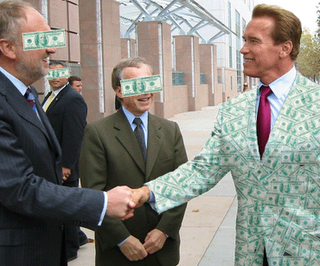
Less Corporate Money, More Voters - Proposition 89 would loosen corporations' stranglehold on elections, a major factor in keeping turnout low
By Jamie Court
Los Angeles Times
October 10, 2006
WITH A FULL four weeks to go before election day, more than $400 million has already been spent on California's ballot measures and political races. If the number surpasses half a billion dollars, as many believe it will before Nov. 7, it could make this year's election the most expensive in state history.
Ironically, that extraordinary amount of money (and the deluge of television advertising that it will buy) guarantees only one thing on election day: that more voters will stay home.
A recent report by the nonpartisan Public Policy Institute of California shows why special interests that want to preserve the status quo like it that way. If nonvoters went to the polls, the institute found, they would favor a more activist government — voting out Arnold Schwarzenegger and passing big bond measures. The institute identifies an "exclusive electorate" that is older, richer, whiter and more conservative than the average Californian.
"If the trends in voting continue, we face the prospect of an electorate making policy choices that neglect the realities and problems facing large segments of California society," said the study's author, Mark Baldassare.
Voter disaffection and disgust are especially intense regarding ballot measures. A poll in 2005 by the institute found that more than 92% of voters believe that special interests control the initiative process. Interest groups that want to torpedo reform know that noisy, confusing television ad campaigns turn voters off to voting yes — and often to showing up at all.
Such a climate works well for the oil companies that have poured $52 million into the campaign against Proposition 87, the proposal to create an alternative-energy fund through a tax on oil company profits. Hollywood producer Steve Bing answered back and matched the industry's ad purchases, but big money on both sides is quicksand. Polls show that Proposition 87's support has slipped from 53% to 44% since the television ad wars began this summer.
The mostly tobacco-company-funded campaign against Proposition 86, the proposed healthcare fund created from an increase in the tobacco tax, has spent $55 million to date. That has knocked support for 86, whose proponents have raised far less, from 63% in July to 53% now.
The sheer volume of political advertising is drowning out all real political debate and corrupting the initiative process. But the answer to the problem of big-money political campaigns is on the November ballot.
The political finance reforms of Proposition 89 would limit ballot measure contributions by corporate treasuries to $10,000. Corporations account for the vast majority of spending on ballot initiatives, and limiting the biggest spender reduces the overall pot. The other ballot measure spenders — individuals and labor unions — are not restricted under Proposition 89, but they have far fewer resources overall (Bing notwithstanding). What's more, courts have frowned on the limitation of political spending by individuals and their political associations.
Proposition 89's ballot initiative spending limit has been attacked by big corporations as threatening to silence their political speech. In fact, under Proposition 89, corporations could still ask their executives, managers, customers and investors to give unlimited amounts for or against ballot measures.
At the moment, the playing field is sharply tilted toward corporations because of their extreme wealth. ExxonMobil, for example, made more than $8 billion in profit each of the last three quarters. Its chief executive officer took home $400 million in compensation last year, more money than the total revenue of any labor union in the state. Retiring Chief Executive Lee Raymond could still have a significant political effect if he chose to spend his money. But the reality is that individuals are much more likely to write smaller checks.
Proposition 89 would start restoring sanity in political spending, and not just by reforming the financing of ballot measures. It also would provide for public funding for candidates willing to forgo private fundraising from special interests, which is likely to reduce overall candidate advertising.
Ironically, the voters who would benefit most from the reform are the ones most likely to stay home, discouraged and disgusted by the power of money. The question is whether they will see past the blitz of deceptive, negative advertising to find out what the power of one more vote could be.
JAMIE COURT is president of the Santa Monica-based Foundation for Taxpayer and Consumer Rights.

No comments:
Post a Comment